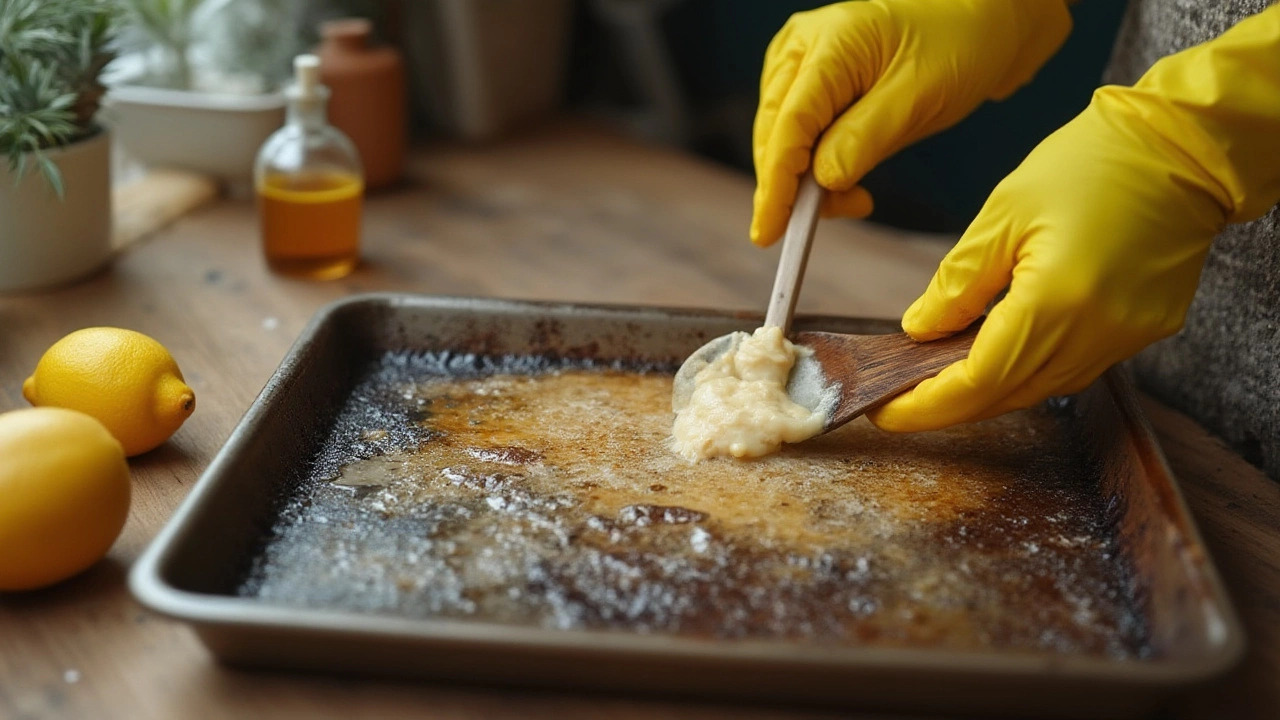If you’ve ever peered through your oven door and squinted at thick, black greasy patches clinging to the sides, you’re definitely not alone. Ovens seem to attract stubborn, burnt-on grime like they’re hosting a festival nobody wants to attend. But ignoring it isn’t just a cosmetic thing—it can be a fire hazard, mess with your food’s flavour, and even hike up your electricity bill. There’s a myth that you need industrial chemicals or weeks of elbow grease to get rid of the worst of it. Luckily, that’s all nonsense. There are proven, budget-friendly tricks that’ll break down even the grumpiest of black baked-on grease—no chem-warfare suits needed. Let’s decode what works, why it works, and which shortcuts you can skip.
Understanding the Science of Baked-On Grease
Baked-on oven grease is more than just old oil—it’s a mix of fats, carbonized food, and sticky sugars that have fused together under intense heat. Every splash of roast chicken fat, escaped pie filling, or oil slicked veggies adds layers. When these layers are repeatedly exposed to 200°C (about 400°F) or more, the fats reorganize into stubborn polymer chains. This chemical change is why the stains are so hard—a splash of washing-up liquid won’t even tickle them. You’re facing a chemical shield, basically baked into place. In fact, the National Association of Home Builders in the UK reports oven cleaning is one of the most neglected household chores, with nearly 30% of home ovens scoring ‘heavily soiled’ on surveys. This grime doesn’t just look bad. If left to build up, it can trap heat inside your oven, making it run less efficiently and even risk setting off smoke alarms during a Sunday roast. Knowing the enemy helps—because you’ll see why standard cleaning sprays flat-out fail to budge these stains and why breaking up that sticky matrix requires the right combination of abrasion, temperature, and chemical power.
Prepping Your Oven: What You Need, What to Skip
Before you dive in, resist the urge to just grab any cleaner from the cupboard. Some products work wonders, but others can actually damage oven linings—especially if your oven has a self-cleaning enamel surface. You won’t need fifty quid’s worth of gear. A few targeted supplies do the job. Here’s a smart checklist:
- Rubber gloves—to keep harsh cleaners off your skin.
- Old towels or newspapers for floor protection.
- Plastic or silicone spatula (not metal—avoids scratches).
- Scouring pads or microfibre cloths—ideally not wire wool if you want to keep enamel happy.
- Baking soda and vinegar—these are a power couple for natural cleaning.
- Spray bottle filled with water and a splash of white vinegar.
- If you’re in a hurry: a decent store-bought oven cleaner (look for brands like Oven Pride or Astonish from local supermarkets in Bristol—these are UK approved for domestic ovens).
- Torch or phone flashlight—helps you spot grease lurking in the shadows.
Avoid bleach and ammonia: they’re too harsh, create dangerous fumes, and sometimes even react together to form toxic gases. Trust me, you don’t want to be that guy with a home evacuation because of a cleaning session.

Step-by-Step Methods: Getting Rid of Black Baked-On Grease
Alright, time for action. Here are tried and tested methods for shifting the worst black baked-on grease, whether you want to go natural or need a quick fix before a dinner party.
Method 1: The Baking Soda Paste Method (Natural and Effective)
- Start with a cold oven. Remove racks and trays. Lay old towels under the oven door to catch drips.
- Mix half a cup of baking soda with enough water to make a thick paste. Slather this paste all over greasy patches, spreading it thick where the black crud is worst.
- Leave it to sit overnight, if possible—baking soda needs time to break down fatty bonds. At least 12 hours works wonders.
- The next morning, wipe off as much hardened paste as you can with a damp cloth. Most grime will come off in chunky sheets.
- Spray the inside with a vinegar-water solution. The fizzing reaction grabs the leftover bit of grease and softens it further. Wipe clean, rinse, and dry with a fresh cloth.
This works because the alkalinity of baking soda chemically weakens those bonded grease molecules. Vinegar then helps dissolve any final sticky sugars left behind. Studies at consumer product testing labs in the UK showed baking soda mixes beat standard multipurpose sprays by almost 40% for removing deep baked-on grease (especially in ovens over three years old).
Method 2: Steam Clean with Lemons (Great for Regular Maintenance)
- Slice two lemons in half. Place them cut side down on a baking tray filled with water.
- Heat the oven to 180°C (about 350°F) and bake the tray for 30 minutes.
- Turn off the oven, let it cool for a few minutes, then use a damp cloth to wipe away loosened grease. The steam and citric acid combine to dissolve lighter grease and fresh spills.
Is it strong enough for years-old patches? Not really. But for ongoing care or for ovens that aren’t caked in black gunk, it’s genius—smells citrusy fresh too.
Method 3: Heavy-Duty Store-Bought Cleaners (For the Impatient or the Ambitious)
- Double check your oven’s manual—some self-cleaning ovens have coatings that harsh chemicals can wreck. Otherwise, suit up with gloves and ventilate the kitchen.
- Apply spray or foam cleaner liberally to the worst areas. Some products require a few hours to work—some say overnight—read your product’s instructions.
- Scrape carefully with a spatula, then wipe with a damp cloth. Repeat if patches remain. Rinse thoroughly to avoid chemical residue when you next cook.
Getting into the Nooks and Crannies: Racks, Trays, and More
Black baked-on grease isn’t shy. It clings to everything, especially the oven racks and glass door. Here’s how to show it the exit everywhere:
- Soak racks and trays in the bathtub with hot water plus half a cup of dishwasher powder (not tablets—they don’t dissolve the same way). Leave it overnight. In the morning, grime should wipe away with minimal effort.
- If space is tight, pop racks in a large plastic bin with a baking soda and vinegar mix, or use an old toothbrush to get into crevices.
- For oven glass, smear the same baking soda paste and add a squeeze of lemon for grit. Let it sit, then scrub gently with a microfibre cloth. Avoid using razor blades unless you’ve accepted the risk of permanent scratches.
A fun fact: Of all parts of the oven, glass doors are the most attacked by burnt-on grease—nearly 60% of calls to Bristol’s top cleaning firms in 2024 were related to oven window cleaning.

Keeping Your Oven Cleaner Longer: Prevention and Quick Fixes
Once you’ve battled the black baked-on grease and actually won, you’ll do almost anything not to see it again, right? Turns out, keeping on top of it is much easier (and less disgusting) than dealing with a year’s worth of build-up.
- Wipe up spills as soon as the oven is cool—every time food splatters, you want to catch it before it sets.
- Place a baking tray or oven liner (silicone reusable ones are easy to clean) on a lower rack—this catches dripping grease before it gets baked on. Just don’t cover the oven fan or vents.
- Use roasting bags or foil ‘rafts’ for drippy meats—less mess, fewer surprises.
- Steam clean your oven once a month, even if it looks decent. It’s quick maintenance that saves you heavy-duty jobs later.
If you don’t love DIY, check the table below for a comparison of popular professional oven cleaning methods in the UK—sometimes calling a pro is just worth it.
| Cleaning Method | Average Price (GBP) | Time Required | Effectiveness (out of 10) |
|---|---|---|---|
| DIY Baking Soda/Vinegar | £2-5 | Overnight | 8 |
| Supermarket Oven Cleaning Kits | £4-12 | 2-4 hours | 9 |
| Professional Oven Cleaners | £40-70 | 1-2 hours | 10 |
If you’re not sure your oven’s up to a DIY deep clean, you’re in good company—nearly half of renters in Bristol reported outsourcing oven cleaning at least once during the past two years. Don’t sweat it. The trick is to find what works for you—and not let things get out of hand again. Black baked-on grease won’t know what hit it.
